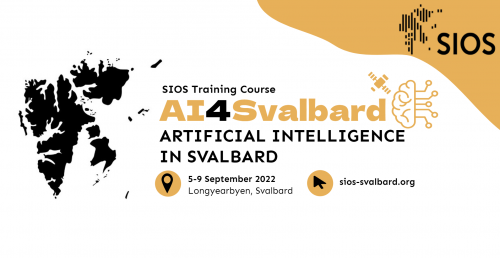In autumn 2022 SIOS held a training course on how to effectively use AI methods in Arctic Earth observation with special focus on research in Svalbard. The goal of the course was to teach participants the basic skills needed to use AI methods with Arctic Earth observation datasets. The training was delivered by remote sensing experts from SIOS member institutions, international researchers, and experts from industry.
- Time: 5 - 9 September 2022
- Location: Longyearbyen, Svalbard
- Recordings: Available
COURSE PROGRAMME
- 5 September 2022
-
Lightning talk - AI for wildlife monitoring...from space - Video
Ellie Bowler (British Antarctic Survey)Introduction to AI and applications in the Arctic - Video
Nabil Panchi (NTNU)Introduction to Data Analysis - Video
Nabil Panchi (NTNU)Data & libraries for Machine Learning and Deep Learning (hands-on)
Nabil Panchi (NTNU)Data choice & visualisation (hands-on)
Nabil Panchi (NTNU) - 6 September 2022
-
Lightning talk - Deep Learning for Earth Observation and glacier mapping - Video
Claudio Persello (ITC, University of Twente)Supervised and unsupervised learning (and some Arctic applications)
Andrea Marinoni (UiT the Arctic University of Norway)Lightning talk - The AI-CORE project - Artificial Intelligence for cold regions
Andreas J. Dietz and Celia Baumhoer (German Aerospace Center)Keynote talk - AI for polar remote sensing - Making sense or making it up? - Video
Michel Tsamados (University College London)Sea ice surface AI classification techniques (hands-on)
Michel Tsamados (University College London) - 7 September 2022
-
Excursion to Endalen
Classification (pixel segmentation) using satellite data (hands-on)
Sara Aparício (Solenix for ESA, Italy & NOVA School of Science and Technology)Lightning talk - Random ways that I use machine learning in glaciology - Video
Leigh Stearns (University of Kansas)SIOS Data Management System and Data Access Portal
Ilkka Matero (SIOS-KC)Clustering a Copernicus Sentinel-2 image (hands-on)
Sara Aparício (Solenix for ESA, Italy & NOVA School of Science and Technology) - 8 September 2022
-
Introduction to Deep Learning - Video
Cristiano De Nobili (Pi School)Lightning talk - Penguins, permafrost, and trees - object identification in high-res imagery with Deep Learning
Claire Porter (Polar Geospatial Centre)Arctic Applications (hands-on)
Student presentations
- 9 September 2022
-
Excursion to SvalSat facility
GENERAL COURSE INFORMATION
- Target audience
-
The course is intended for scientists, master/Ph.D. students and technicians with no or modest experience with AI and machine learning in their research. Basic knowledge of programming languages (python) is preferable.
- Course objectives
-
General objectives
Many scientists from SIOS member institutions have been working on research projects which would greatly benefit from the addition of AI methods. SIOS member institutions have installed various research infrastructures in Svalbard which deliver long-term data (https://sios-svalbard.org/metsis/search). SIOS-InfraNor project (https://sios-svalbard.org/InfraNor) involves installation of research infrastructures ranging from new instruments to remote sensing products. However, scientists may lack the necessary training required to make efficient use of available datasets using modern AI methods. PhD students from SIOS member institutions who are about to begin careers using remote sensing as well as in situ data as an integral part of their research projects can especially benefit from this training course.
This course will consist of following activities:
- Theoretical lecture series
- Hands-on, demo and practice sessions
- Field excursion and social events
- Mini-projects
Learning objectives
At the conclusion of the educational activities (5-9 Sept 2022) and the following mini-projects, you should understand the basis for spatial and temporal data analysis (focus on SIOS data and/or Earth observation data) and recognise errors in the received data as well as understand the value of information and how to share a code and collaborate on a project using a collaborative coding tool.
At the end of the course the student is able to:
- process, visualise, and manipulate specific data by using a computer program and critically assess the quality of the data;
- understand how to apply, test, and interpret machine learning algorithms (clustering and decision trees) as methods for addressing research questions from your own/team research projects;
- apply clustering and decision trees techniques to SIOS/own datasets;
- apply deep learning (DL) techniques to selected/own datasets.
Participants are expected to:
- achieve basic/beginners understanding of AI in Arctic;
- achieve understanding of AI applications in Earth observation in general;
- be able to utilise simple methods in AI in their own research;
- be able to define a mini-scale project using their own data or SIOS data.
- Lecturers
-
Keynote speaker:
- Michel Tsamados (Department of Earth Sciences, University College London (UCL))
Teachers:
- Cristiano De Nobili (Pi School, Italy)
- Nabil Panchi, (NTNU)
- Andrea Marinoni (UiT the Arctic University of Norway)
- Sara Aparício (Solenix for ESA, Italy & NOVA School of Science and Technology, Portugal)
Lightning speakers:
- Leigh Stearns (University of Kansas, USA)
- Claire Porter (Polar Geospatial Centre, USA)
- Ellie Bowler (British Antarctic Survey, UK)
- Claudio Persello (ITC, University of Twente)
- Andreas J. Dietz (German Aerospace Center)
Mentors for mini-projects:
- Cristiano De Nobili (Pi School, Italy)
- Nabil Panchi (NTNU)
- Andrea Marinoni (UiT the Arctic University of Norway)
- Sara Aparício (Solenix for ESA, Italy & NOVA School of Science and Technology, Portugal)
- Shridhar Jawak (SIOS-KC)
- Task force
-
This training course is organised by a task force comprised of the following members:
- Ekaterina Kim (NTNU)
- Jie Zhang (Uppsala University)
- William Harcourt (University of St. Andrews)
- Sara Aparício (Solenix for ESA/NOVA University of Lisbon)
- Shridhar Jawak (SIOS-KC)




























